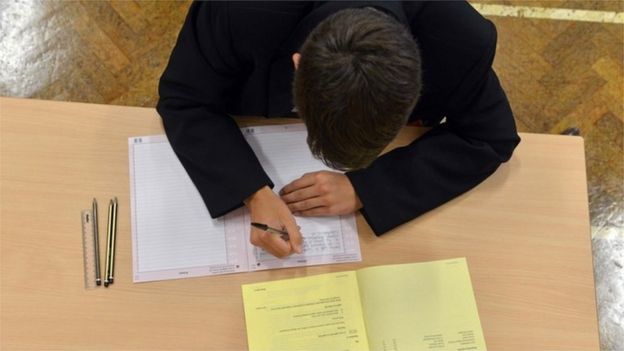
On exam results day, education correspondent Jamie McIvor asks a fundamental and unfashionable question: is it a good thing that more youngsters than ever before stay on at school or go to college and university?
Exam passes are high by historic standards, more youngsters are staying on at school and going to college or university.
Is this a good thing in itself? Or is the education system simply having to adapt to the fact that in the modern world there are fewer good jobs for young people, and that unskilled jobs are disappearing?
It is an interesting philosophical question to contemplate – one quite distinct from the question of ensuring all young people can achieve their potential in education, regardless of wealth or family background.
- Where to go for help on exam results day
The suspicion of some has always been that the education system has had to soak up youngsters who might otherwise have been unemployed – either because of economic problems or the gradual disappearance of some unskilled jobs.
In the 1970s the school leaving age was raised from 15 to 16 but it took a further 10 years for a qualifications system which had been designed with the more academically-able in mind to evolve.
For many years, youngsters who were not able to study for a full suite of O grades filled their third and fourth year timetables with “non certificate” courses – seen by some as a waste of effort. The boredom these students experienced was blamed by some teachers for indiscipline.
Standard grades were designed to make sure all youngsters could get a meaningful qualification. This underlying ethos has been carried into the current National qualifications.
But in the 1980s it was still unusual for a youngster who was not studying for Highers to stay on until S5. When someone who was not doing Highers stayed on past their statutory leaving age, again the suspicion of some was that the youngster was only at school to “stay off the dole”.
In Scotland the official school leaving age is still 16, but the majority of pupils, regardless of their academic ability, stay on until S6. It is now unusual to leave at the end of S4 and schools would be genuinely concerned if a youngster wanted to leave early without a good reason for doing so.
Positive outcomes
S4, S5 and S6 are now classed as the “senior phase”. The emphasis is on the qualifications a youngster has at the time they leave – not on what they have achieved by a particular stage.
The number of so-called Neets – youngsters who are not in education, employment or training – is at a very low level by historic standards.
The Scottish government guarantees youngsters who are not in a job a place in education or training. It is often the case that a pupil classed as a Neet has a long back story which helps explains the situation.
If a pupil leaves school before the end of S6 because they have secured an apprenticeship or a place at college or university it would be deemed to be a “positive outcome”; if a youngster simply wanted to leave school for a dead-end job a school might worry this was a failure on their part as the pupil may not have been enjoying their education.
 Image copyrightAFP/GETTY
Image copyrightAFP/GETTYThe senior phase is designed to offer a flexible system where any youngster can achieve something of value.
For the most academically-able, the question may be what Highers or Advanced Highers they leave school with. For others, it might be about the number of National 4s and 5s they obtain – even one Higher might represent a big personal achievement.
Colleges have been through a huge shake-up in recent years and now concentrate primarily on full-time courses which lead to a recognised qualification – these are mostly taken by students in their teens or early 20s.
Drop-out rate
Privately, some in the college system warn that colleges are having to accommodate youngsters who might otherwise have been unemployed, as well as those who positively want to be studying a subject. This may be reflected in the drop-out rate for some courses.
So we return to the question: is a school system where it is unusual for a youngster to leave early and a college system which has to find places for those who would otherwise be unemployed achieving something positive in itself?
Or is it merely parking the youth unemployment problem, just like non certificate S4 classes in the 1970s?

Few in the mainstream would seriously argue that educational opportunities should not be as widely available as possible.
But the issue touches on an intriguing question. Once, it was possible to leave school with O grades and get a job with prospects. Not so long ago, many good jobs were available to youngsters with good Highers.
Today, other than modern apprenticeships, most good jobs for young people require a college or university qualification first.
So is the education system having to deal with the practical effect of economic change?
De-industrialisation and automation mean many of the unskilled, entry level jobs once filled by school-leavers no longer exist.
Or are the changes positively helping to provide the workforce the economy needs?
Skilled workforce
The argument is that Scotland, like every advanced country, needs as skilled a workforce as possible to compete internationally and fulfil its potential.
A skilled workforce does not just mean turning out scientists and surgeons – it means hairdressers and staff for the hospitality industry too.
Once, fewer people in those industries would have received any formal college training and might simply have learned on the job or served a traditional apprenticeship. But the argument is that a proper course and training raises standards and allows the best to shine.
Anecdotally, of course, many of the genuinely unskilled jobs which those with few qualifications may once have done – say stacking shelves in the supermarket – are now done by students or those with college or university qualifications who find themselves “underemployed” .
Indeed, while the number of young people at university is close to a historic high, a significant proportion of graduates do not secure what would be seen as graduate-level jobs even if few would do unskilled work for long.
None of this is to suggest a good education is not of value in itself – even if it does not lead to someone getting a better job than they may have got otherwise.
But perhaps it is interesting to reflect on how in the space of barely 40 years, the time someone routinely spends in education has increased. Once, a basic education ended at 15; now few teenagers are completely out of the system.
Source:-BBC





